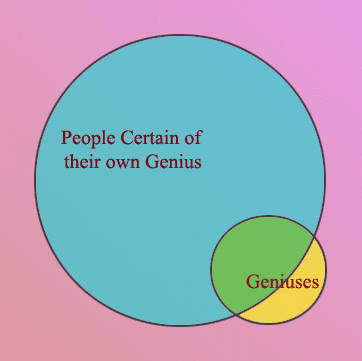Immortality, wednesday
We talk for a while, and I review her chart. I’m not really sure why she’s seeing me. She’s seeing her Gyn/Onc doctor every other week for monitoring her chemotherapy. So her medical needs were being cared for, except for her high blood pressure, which isn’t much of an issue in someone with a terminal diagnosis.
‘What can I do for you today?’ I ask, as I can see no obvious reason for her visit to me.
She asks for refills on her blood pressure meds. I see that her blood pressure is too high this morning, but the risks of side effects from new medications outweigh any benefit of blood pressure control during her brief lifespan. I write the scripts exactly as she had received them previously. Then sit back in my chair and look at her.
I’m not sure she understands the nature of her diagnosis or that the chemotherapy she’s receiving is only palliative.
‘What,’ I ask, ‘is the goal of your chemotherapy?’
‘To make me feel better, I think.’
‘Okay,’ I say. ‘So you understand that the cancer is not curable? That they are giving you the chemo with the hopes that it will improve how you feel in the time you have left and maybe extend that time by a bit.’
‘Yes,’ she says, and then silence, staring at me, mouth closed. I’m silent too, thinking about how to proceed.
‘Ma’am, has your oncologist or anyone discussed end-of-life issues with you?’
‘No,’ she says, and silence again.
‘Well, I’m just meeting you, so I don’t know that we need to have a full discussion today, but one thing I try to discuss with my patients—all of them really, but it’s especially incumbent upon me when they have cancer or some other life threatening condition—is what you want to have happen when your heart stops beating—when you die. Now, it’s going to happen to all of us, my heart and yours, and the default—the obligation—for us at the hospital and for fire-rescue is to try and restart your heart.’
I pause. She says nothing.
‘When we try to restart your heart, it isn’t a gentle massage. We’ll break a lot of your ribs in the process. Then we’ll shock the heart to try and restart it: It’s a lot of electricity and it burns the skin. The goal of all that is to get the heart beating so that we can put a tube down into the lungs and start the ventilator, start the life support machines. If someone does not want to be on life support, all the other things are pointless. For someone otherwise healthy, they may only be on life support for a day or two. But for someone like you, someone whose heart has stopped as part of a terminal illness, the life support will likely continue until your other organs start to fail.’
I pause again. She continues to stare quietly at me, not saying anything.
‘The other thing that I feel we should talk about, is that there is going to come a point when the chemotherapy is going to be stopped, when it won’t be effective at prolonging your life or helping your pain anymore. When that time comes, and maybe before it, I think we may want to get you involved with hospice. Hospice is an organization that specializes in controlling your pain and making you comfortable. They help you and your family deal with everything that occurs when you are dying.’
‘I’m familiar with hospice,’ she says, noncommittally, her silence finally broken for a moment, but then it returns.
‘These are not decisions that need to be made today,’ I said, ‘you can discuss them with your family or oncologist, or you can just think on them for a while. I don’t have any reason to think any of this is eminent. But when the time comes, I don’t want you to make a rushed decision. I think it would be good for you to have some time to ruminate on these things.’
Still silence.
‘Do you have any questions for me?’ I ask.
A moment more of silence, then she says, ‘How old are you?’
‘Ma’am?’
‘You talk like a really old doctor, but you don’t look old,’ she says. ‘No one else has been willing to talk to me about this.’
And so it begins…





